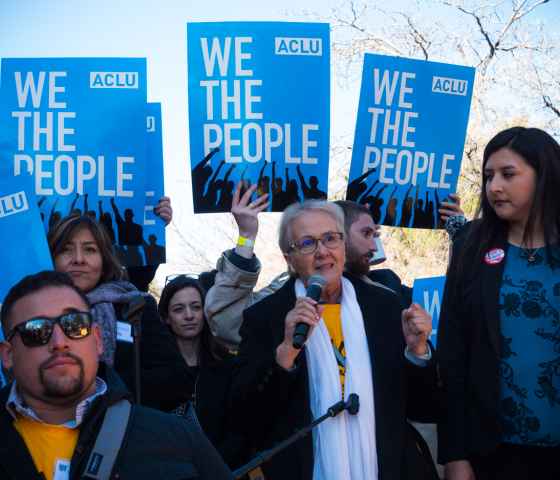Incarcerated and denied medical care.
“As I sat there in the cold hospital waiting room, dreading the moments and days ahead, the other women I arrived with came back smiling,” said Jennifer. “To see photos of their ultrasounds while waiting for a surgery that would rob me of the chance to be a mother was like rubbing salt in my wound.”
Every time Jennifer* looks at herself naked she sees the scar across her abdomen and is taken back to the day she underwent a full hysterectomy. She remembers how prior to her surgery, she spent three years in continuous agony, pleading with correctional officers for help in Grants, New Mexico.
“I could never understand why it was so difficult for them to show me just a shred of compassion… a shred of humanity"
When she runs her fingers across the smooth blemish, Jennifer wonders if she ever would have developed advanced endometrial cancer if only prison staff would have taken her to get a biopsy sooner, rather than blaming her vaginal bleeding on her weight and prescribing birth control, which in fact worsened her condition.
“I could never understand why it was so difficult for them to show me just a shred of compassion… a shred of humanity,” said Jennifer through tears. “I left the hospital just five days after my surgery, with 27 staples still in my abdomen, and the prison couldn’t even be bothered to change my bandages.”
With no one else to turn to, Jennifer took to using sanitary napkins to keep her wound clean, but despite her best efforts, she developed a life-threatening infection known as MRSA. The prison delayed removing her staples for so long that her skin began to heal over them, making removal difficult and painful. Eventually Jennifer’s wound and infection healed, but years of torment and neglect left her with emotional scars that are still fresh.
Sadly, Jennifer’s story is not unique.
Every day, women behind bars suffer from treatable physical and mental illnesses. But they are ignored or forgotten. Their treatment is delayed. And when they finally receive it, care is inadequate. All too often, the consequences of this neglect are dire.
Our country’s penchant for punishment over tackling the root causes of crime has created a criminal justice system wherein tragedy and death are expected outcomes. Treating imprisonment as the only answer to violations of the law — or even possible violations of the law — has made us blind to people’s humanity and blind to the harm that results not just for incarcerated people, but for entire families and communities.
The ACLU of New Mexico is fighting to end this cruel system. We are documenting the stories of incarcerated people who have been denied medical care and who have suffered at the hands of prison staff, and we are working tirelessly to institute protections through administrative processes, the legislature, and the courts.
"My cancer could come back at any moment and what will happen if I don’t get the treatment I need?"
Nearly forty years ago, the U.S. Supreme Court ruled in Estelle v. Gamble that ignoring a prisoner’s serious medical needs amounts to cruel and unusual punishment under the Eighth Amendment. As the Court pointed out, incarcerated individuals are completely dependent upon prison authorities for every necessity, including treatment of their medical needs. If staff refuse to help them, they have no other recourse.
Just last month, Jennifer reached out to us after the facility where she is incarcerated refused to take her to a three-month follow-up appointment concerning a lump in her breast. We wrote the prison a letter demanding they make immediate arrangements for Jennifer to see her doctor, and reminding the prison that deliberate indifference to Jennifer’s medical needs constitutes a violation of her rights under the United States Constitution.
“My biggest fear is that I will slip through the cracks again,” Jennifer said. “My cancer could come back at any moment and what will happen if I don’t get the treatment I need? I know one thing — I won’t stop fighting for myself or for all the other women in here struggling to get their basic needs met.”
*Our client’s name has been changed to protect her identity.




